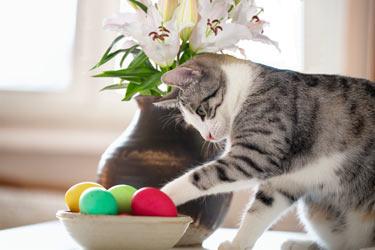Easter Lilies: A Holiday Hazard for Cats

Easter is the holiday that marks the beginning of spring. The lovely Easter colors, foods, and festivities are definitely welcome after the long winter season. However, there are some Easter hazards for cats to be aware of during this special time. Don't let your cats eat chocolate, and beware of them eating string-type objects such as Easter grass. Another Easter tradition to be conscious of if you have cats is decorating your home with Easter lilies.
Easter Lilies are Deadly to Cats
Lillium sp. and Hemerocallis sp. of lilies, including Easter, Asiatic, tiger, and day lilies are all incredibly toxic to cats. It is not known what causes this toxicity.
Ingesting any part of the Easter lily plant causes acute kidney failure in cats. This appears to be due to the death of kidney cells, but the exact mechanism by which it occurs is not known. Cats can be poisoned by Easter lilies in the following ways:
- Eating less than one lily leaf can cause a cat to develop kidney failure.
- Cats may rub up against the lilies or walk through pollen that has dropped from the flowers. When they groom the pollen off of their fur or paws and ingest it, they can be poisoned.
- Chewing on and swallowing the flower of the Easter lily results in toxicity.
Signs of Easter Lily Toxicity in Cats
The following signs are seen in cats that are poisoned by Easter lilies:
-
Within two hours of ingestion:
- Vomiting is often the first sign of Easter lily toxicity.
- Anorexia, or unwillingness to eat accompanies the vomiting.
- The cat develops lethargy, and doesn't want to move around or play.
- Increased urination may be present in between two and twelve hours after the cat consumes the lily. After that, the cat may stop producing urine altogether, as the kidneys shut down.
- Death usually occurs within three to four days of lily toxicity that is untreated.
Treatment of Lily Toxicity in Cats
If you know or even suspect that your cat may have ingested any part of a lily plant, take your cat and the plant, if you have it, to the veterinarian immediately.
The following therapies are all used to treat cats that have ingested lilies:
- Induction of vomiting to remove as much of the plant as possible before it is absorbed into the cat's system. This needs to be done fairly quickly after ingestion.
- Activated charcoal is administered to the cat to absorb as much of the remaining plant product from the stomach as possible and carry it through the GI tract without allowing to be absorbed.
- Intravenous fluid therapy is administered at a high rate in order to flush the system of the lily toxins and support the kidneys.
If treatment is delayed until eighteen hours or more have passed since ingestion of the lily, your cat's prognosis for recovery decreases dramatically. When it is caught early and treated aggressively, lily toxicity usually carries a good prognosis for full recovery.
You May Also Like These Articles:
Polycystic Kidney Disease (PKD) in Cats
Common Plants Poisonous to Cats
How to Keep Your Cat from Chewing on Houseplants
First Aid for Cats: An Overview
Foods Toxic to Cats - Slideshow
Subcutaneous Fluid Therapy: Giving Your Cat Fluids at Home
Notice: Ask-a-Vet is an affiliated service for those who wish to speak with a veterinary professional about their pet's specific condition. Initially, a bot will ask questions to determine the general nature of your concern. Then, you will be transferred to a human. There is a charge for the service if you choose to connect to a veterinarian. Ask-a-Vet is not manned by the staff or owners of CatHealth.com, and the advice given should not delay or replace a visit to your veterinarian.




